James George Preston, A Tailor of Tewkesbury
to Expand
If you mention the surname ‘Preston’ to any long-time residents of Tewkesbury, then their memories recall either or both of Ted Preston, who was the Town Crier for many years – or Mr. Preston, the tailor. They were not related. The story I am to tell is about the tailor and how, after arriving in Tewkesbury, he contributed to the business and social life of the town.
I was brought up in Ross-on-Wye, where my father had established a butcher’s shop after the First World War. Most of his childhood had been spent in Tewkesbury and he never tired of telling of how he sang in the Abbey Choir, went fishing from the Ham and of his exploits in exploring the alleys of the town. Whenever possible he would always make his way to Tewkesbury to attend the Mop Fair. When the reorganisation of Local Government brought my husband, David, to Tewkesbury in 1974, it was not long before I met the late Ernie Jordan, who was then aged ninety. He was able to tell me that he delivered the Gloucestershire Echo to my grandfather in Chance Street, who was a keen pigeon fancier, and always smoked cheroots. This inspired me to find out more about the family in the town.
James George Preston, my grandfather, had been born in the Oxfordshire town of Burford, one in a long line of tailors who had practised their trade in the border area between Gloucestershire and Oxfordshire. He served his apprenticeship and went into partnership with his brother in Burford in the 1870s. He was married in 1880, when the partnership was dissolved, and he moved to Bourton-on-the-Water, establishing his own business and living at a property known as Lower Bank, which to date I have been unable to pinpoint. By 1893, he and his wife, Martha, had produced six children, including my father Vincent Preston.to Expand
After being a tailor for so long, it was a major surprise to learn that, when he moved to Tewkesbury, he became a publican taking over the licence of the Wheatsheaf in the High Street in December 1893.[1] It was not too long before his name appeared in the local newspapers since, in May 1894, he noticed that there was a strong smell of gas in the bar. He climbed on to a table to locate the source of the gas but, being unable to see, lit a match, with the inevitable result. A loud explosion blew him to the ground and destroyed the window between the bar and the Wheatsheaf Alley. Fortunately, grandfather escaped serious injury and, in the evening, he was behind the bar, sporting bandages around the abrasions to his head.[2]
In June 1896, he gave up the licence of the Wheatsheaf [3] and moved to 54 High Street, on the corner of Red Lane, reverting to his trade as a tailor. He advertised in the pages of the Tewkesbury Weekly Record, that he was a tailor and breeches maker, who had a “splendid assortment of patterns suitable for the spring and summer seasons”. He urged readers to “Compare prices and style, which will be found unequalled”.[4]It was during this period that grandfather became involved in the establishment of the Tewkesbury and District Fanciers Association. Originally this was to have been a club for breeders of poultry but, when he attended the inaugural meeting, at which Viscount Deerhurst (the heir to the Earl of Coventry) was in the chair, he was elected to the committee as a pigeon fancier[5] He became involved in the affairs of the association and helped in the many reported flying competitions.
By 1898, he had taken over the tenancy of one of the Market Shops in Sun Street, owned by the Borough Council but, in order to supplement his income, he returned to the licensed trade, as landlord of the Masons Arms in Church Street which is now the Royal British Legion Club.[6]
The pages of the local newspapers at this time always gave prominence to reports of cases heard in the Police Courts and so it was in June 1899 that, under a headline of “An interrupted Conflict”, the name of James Preston appeared.[7] Police Constable Baker told the magistrates that when he was on duty at 10.45pm, he noticed several people making their way to Back of Swilgate. He followed them, finding James Preston and William Thorne squared up to have a fight. He told them to stop, with which command Preston complied – but Thorne refused and was taken into custody for the night. The next morning, Thorne told the court that he had received great provocation from Preston and they had arranged to fight out their differences. The magistrates considered that Thorne had been punished enough by spending a night in the cells and dismissed him with a caution. A few days later, Preston was brought before the court on a charge of making an affray and told the bench that “only one blow had been struck and he got it”. He was bound over to keep the peace for six months in the sum of £10.[8] This appearance before the Mayor (Alderman Baker) and five other magistrates, including Thomas Weaver Moore, does not appear to have harmed his reputation in the town.
In March 1901, grandfather gave up the tenancy of the Masons Arms[9] and took up temporary lodgings at the Wheatsheaf. By this time the family had grown to nine children; the youngest, Reginald, sadly died in infancy. The census taken in April 1901 reveals that five boys were at home, together with the youngest daughter. The two eldest daughters had left home and were working as barmaids at Banbury and Malmesbury. It was no surprise that grandfather advertised in the Tewkesbury Weekly Record for a “house with 6 or 8 rooms with a garden in or near Tewkesbury.”[10] The family moved to the house on the corner of Trinity and High Streets (until recently occupied by the Leopolds Bakery). His tailoring business was successful by this time, since he took a tenancy of a second shop from the council.
The coronation of King Edward VII took place in 1902 and the Town Council set up a committee to organise the celebrations. The Record reported that a public meeting was held at the Bell Hotel, which drew “a capital attendance of the inhabitants”. Various sub-committees were established to undertake the many tasks required for adequate celebrations and, no doubt drawing on his skill as a publican, grandfather was elected as the chairman of the group for supervising the provision of beer.[11] He must have been very busy, since it was reported that, under an awning erected at the Cross, some two to three thousand people sat down to a meal of “good old English fare, roast and boiled beef and plum puddings”, doubtless washed down by beer.
The by-election, to fill a vacancy on the Town Council in October 1904, provided some clue as to grandfather’s political persuasion. The front room of his home in the High Street was used as the committee room for the Unionist candidate, Henry Bishop.[12] After the declaration of the results of the poll, the supporters of the successful Liberal Party celebrated in the streets, during which “a mad brained boy” threw a stone through the window of grandfather’s home. Grandfather made an application to the Town Council to be reimbursed for the five shilling cost of the repair, but this was refused.[13] It is interesting to speculate that this incident caused him to become disillusioned with the local political scene, since he was never to involve himself again. Perhaps this incident encouraged him to look for a quieter place for his home, since he moved to 16 Chance Street soon afterwards.
Grandfather became involved in a number of organisations in the town. He became a member of the Loyal White Rose Lodge of the Independent Society of Oddfellows In 1907, the Oddfellows combined with another Friendly Society in the town, the Ancient Order of Foresters, to organise a sports day. Grandfather entered for the ‘over 40s 120 yards handicap race’, and came first with a time of 13.6 seconds: a creditable time for a man of 56 years of age. His prize was a pair of boots, donated by Mr. W. T. Boughton.[14]
Evidence of his prowess as a fisherman was reported in the Tewkesbury Register in July 1897, when he “caught a very fine bream, which weighed about four pounds” whilst fishing in the River Avon.[15] He was elected to the committee of the Tewkesbury Popular Angling Association in that year[16], and retained his interest in the sport for a great part of his life.
Grandfather was anxious that his children should become useful members of society and the boys all served apprenticeships. The eldest, my uncle Percy, was apprenticed to his father and learned the tailoring trade. In 1901, Percy became a member of the Tewkesbury Volunteers, rising to the rank of Lance Corporal, winning prizes for shooting and drill. He served with the Volunteers until 1913, when he went to Bexhill-on-Sea as a journeyman tailor. He took lodgings there and eventually married his landlady’s daughter.
By the time that the next son, my uncle William, was old enough to be apprenticed, grandfather’s tailoring business was probably unable to sustain a second apprentice and so a place was found for him in the grocery trade at Pontrilas, near Ross in Herefordshire. Eventually, William was to set up in business in Shrewsbury.
The third son was my uncle Harry, who was apprenticed to his father as a tailor. He followed the example of his brother Percy and joined the Tewkesbury Volunteers for a short time, before he left to be a journeyman tailor in Croydon.

My father, Vincent Preston, was apprenticed to learn the butchery trade with the London Central Meat Company. How this came about is unclear, but it is probable that he started work with that company in Tewkesbury and, when an apprenticeship became available in Ross, he was transferred there. By 1915, he had married and was managing a butcher’s shop in Ross.
The youngest son, my uncle Frederick, learnt the trade from his father and remained in Tewkesbury, until he retired in 1960.
Two of the three daughters, my aunts Ethel and Alice, were of an adventurous nature and emigrated to Canada, where they both married in Vancouver. Ethel returned with her husband to England in the mid-1920s to run a poultry farm at Black Bourton in Oxfordshire. Sadly, Alice lost her husband in 1920, leaving her with two daughters. She remained in Canada for the rest of her life.
The youngest daughter, my Aunt Dorothea (Dolly), followed her eldest brother Percy to Sussex, taking employment in the hotel trade in Brighton as a housekeeper.
Life went on quietly in the Tewkesbury tailoring business, until the outbreak of the First World War in August 1914. The war brought sorrow and heartbreak to many families; the Prestons were no exception.
The first of the family to join the army was Harry Preston, who volunteered within days and was drafted into the 2nd Queens (Royal West Surrey) Regiment. After his training he was sent to France, where he volunteered to join a draft in the front line. The Queens were one of the many Regiments who took part in the Christmas truce in December 1914, when men in both the British and German front lines laid aside their arms and joined in singing carols and playing football. Harry continued in the thick of the fighting until 16 May 1915, when he was killed at Festubert. He has no known grave, but is commemorated on the memorial at Le Touret.[17] His name is also listed on the Tewkesbury War Memorial at the Cross and in the Abbey.
As a former member of the Tewkesbury Territorials, Percy was soon in khaki, with the 5th Battalion of the Royal Sussex Regiment. He was also in the thick of the fighting until, in August 1916, he was reported as being missing. Percy had ‘gone over the top’ and became entangled in the barbed wire from which he could not free himself. He was taken prisoner by the Germans, remaining a prisoner-of-war until the end of the war. In 1917, he wrote home to tell his parents that he had met another Tewkesbury man, Corporal Charles Cole, of St. Mary’s Lane, in the same prison camp.[18]
My father Vincent Preston had married before the war and it was not until December 1915 that he was required to register for service in the forces. His attestation took place at Monmouth Castle and he was drafted into the Royal Monmouthshire Royal Engineers, joining the colours in 1916. Details of his service are vague, since he would not talk about the war to his children, but it is known that he served for a short time in France, before moving on to fight in Italy in October 1917. Happily, he returned home safely in 1919.
The youngest son, Frederick, registered for service in 1916, but was found to be medically unfit and so continued to work in the tailoring business. He was anxious to do something for the war effort so he was involved in organising concerts and games competitions, which raised funds for purchasing comforts for soldiers who were being treated in the two temporary hospitals in Tewkesbury, at the Watson Hall and Mitton Manor.
to Expand
Grandfather became increasingly reliant upon his son Frederick, who was the only one of his children remaining in Tewkesbury. In March 1921, he announced in the Tewkesbury Register that he had “handed over his business to his son F. E. Preston.”
Grandfather left Tewkesbury and went to Upton-on-Severn, where he undertook a limited amount of tailoring in a shop in Church Street. He was not in good health and his semi-retirement was not to last for long. He died on 19 June 1923, the cause being heart disease, which had been aggravated by an attack of bronchitis.[20] Strangely, his funeral was not held in his adopted town of Tewkesbury, but in Ross-on-Wye, the home of my father, Vincent Preston. His widow, Martha, went to live with her second son William in Shrewsbury, but she died only four months later and was also buried in Ross.
Frederick carried on the business from the Market Shops, serving a clientele spread from Oxford to Warwick. The Tewkesbury Register carried advertisements, giving an address in Shrewsbury (my Uncle William’s grocery shop) as well as the Market Shop in Sun Street.[21] It is estimated that about 90% of his trade came from outside of Tewkesbury. The shop became a popular place for the exchange of local news and his clients included Colonel Robeson (son of Canon Robeson, Vicar of Tewkesbury), Canon Brian Purefoy, the Roman Catholic Father Morrisey, George Hone the auctioneer, and several members of the Healing family.
Frederick retired in 1960 and the shop was closed. For a short time the premises were occupied as the offices of the coal merchants, W.A. Stallard, but were swept away in the redevelopment of the 1960s.
James Preston must have been proud of the way that all his sons had established their own businesses. He left behind him no particular memorial, but he and his son Frederick are remembered with genuine affection by many of the older people of Tewkesbury.
References
- Tewkesbury Register, 9 December 1893.
- Tewkesbury Register and Tewkesbury Weekly Record, 2 June 1894.
- Tewkesbury Weekly Record, 6 June 1896.
- Tewkesbury Weekly Record, 7 May 1898.
- Tewkesbury Register, 9 January 1897.
- Gloucestershire Record Office – PS/TW/MI/2.
- Tewkesbury Register, 24 June 1899.
- Tewkesbury Weekly Record, 24 June 1899.
- Tewkesbury Weekly Record, 30 March 1901.
- Tewkesbury Weekly Record, 13 April 1901.
- Tewkesbury Weekly Record, 28 June 1902.
- Tewkesbury Register, 5 November 1904.
- Tewkesbury Weekly Record, 17 December 1904.
- Tewkesbury Weekly Record, 25 May 1907.
- Tewkesbury Register, 31 July 1897.
- Tewkesbury Register, 15 May 1897.
- Commonwealth War Graves Commission Debt of Honour.
- Tewkesbury Register, 20 October 1917.
- Tewkesbury Register, 19 March 1921.
- Tewkesbury Register, 23 June 1923.
- Tewkesbury Register, 2 April 1921.
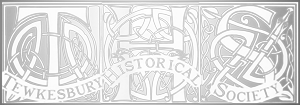
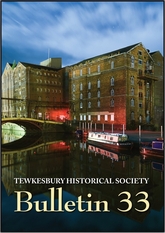
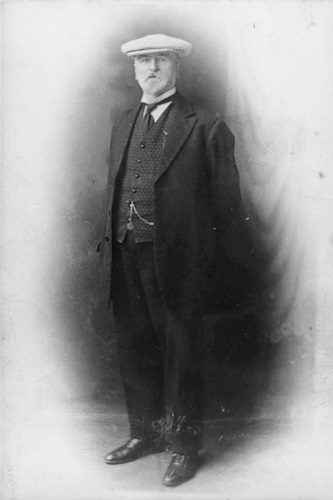
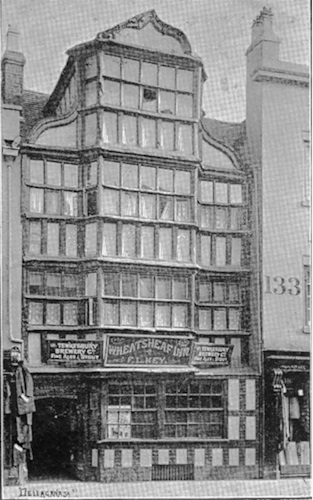
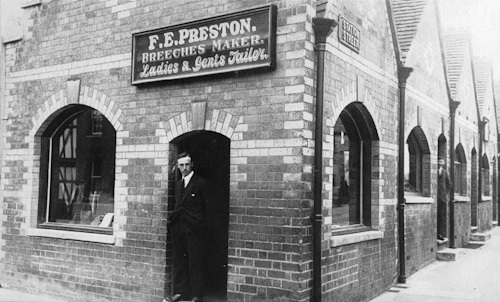
Comments